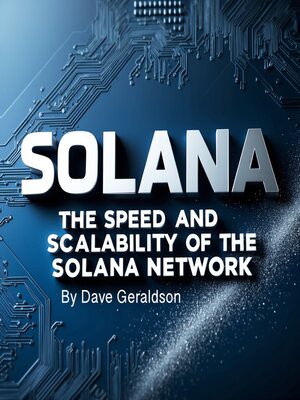
Sign up to save your library
With an OverDrive account, you can save your favorite libraries for at-a-glance information about availability. Find out more about OverDrive accounts.
Find this title in Libby, the library reading app by OverDrive.



Search for a digital library with this title
Title found at these libraries:
| Library Name | Distance |
|---|---|
| Loading... |
This audiobook is narrated by a digital voice.
In the spring of 2017, while the cryptocurrency world was consumed with debates about Bitcoin's block size and Ethereum's scaling limitations, a former Qualcomm engineer named Anatoly Yakovenko was developing a radically different approach to blockchain architecture that would challenge fundamental assumptions about the trade-offs between security, decentralization, and scalability. Working from his experience in distributed systems and wireless communication protocols, Yakovenko conceived of a blockchain network that could theoretically process hundreds of thousands of transactions per second while maintaining the security and decentralization properties that made blockchain technology valuable.
Yakovenko's background in telecommunications and distributed systems provided him with a unique perspective on the scalability challenges facing blockchain networks. During his time at Qualcomm, he had worked on compression algorithms and distributed communication protocols that needed to coordinate activity across thousands of devices in real-time. This experience gave him insights into how timing and coordination problems could be solved at scale, insights that would prove crucial to solving the fundamental bottlenecks that limited blockchain performance.
The core innovation that would become Solana's foundation was Proof of History, a cryptographic technique that creates a verifiable passage of time between events without requiring nodes to communicate with each other to agree on time. Traditional blockchain networks suffered from the problem that achieving consensus required extensive communication between nodes, creating bottlenecks that limited transaction throughput regardless of how powerful individual computers became. Yakovenko realized that if nodes could independently verify the order of events through cryptographic proofs rather than communication, the entire network could operate much more efficiently.







